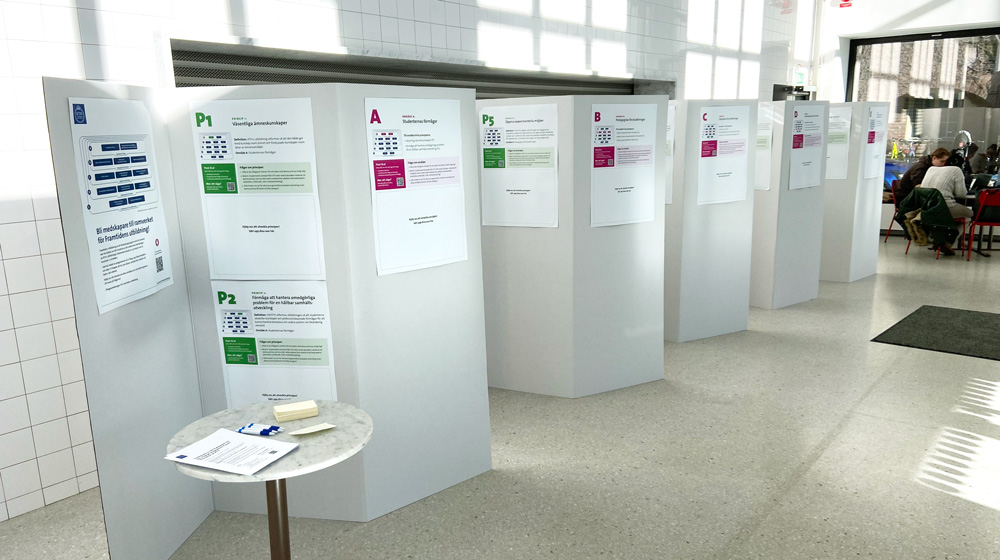Medskaparkampanjen för Framtidens utbildning som står i KTH Entré.
In English further down
Nya typer av studenter kan rädda ekonomin
Våren närmar sig äntligen och med dem konferenssäsongen. Själv planerar jag att åka på årets CDIO konferens 26-29 juni som arrangeras av NTNU vars tema är Engineering education for a smart, safe and sustainable future. Det vore roligt om fler ITM-medarbetare var där; ”Early registration” är redan öppen!
Precis nu är alla skolans masterprogramansvariga färdiga med sina granskningar av de externa studenter som ansökt om att få börja på något av våra masterprogram från och med HT23. Vi kommer kunna erbjuda fler internationella studenter plats på våra program i år, vilket är glädjande, men samtidigt har vi en för stor variation i söktrycket mellan skolans olika masterprogram så det måste vi arbeta med framöver. Ur ett strategiskt perspektiv är det viktigt att vi dels analyserar om alla skolans masterprogram har tillräcklig synlighet, dels om de har en tillräckligt aktuell profil.
Dessutom arbetar skolans ledningsgrupp med rektorsbeslutet Ekonomi-i-balans. För GRU-sidan är en viktig aspekt av beslutet att vi kommer ha möjlighet att öka antalet kursomgångar som externa personer kan läsa som en del av deras fort- och vidareutbildning. Så om ni har förslag på exempelvis programkurser som ges under HT23, där ni gärna ser att det finns en parallell kursomgång för externa studenter så meddela gärna er studierektor direkt! Målet är att ITM-skolan ska kunna erbjuda minst 100 fler externa studenter möjlighet att läsa en kurs hos oss redan under HT23.
Det händer också en hel del inom programmet för Framtidens Utbildning och jag vill framför allt belysa medskaparkampanjen som pågår just nu. Den startade förra veckan under SoTL-konferensen och syftar till att få in olika perspektiv och nya idéer till ramverkets innehåll utifrån alla KTH:s medarbetare och studenter. Lämna ditt bidrag fysiskt på KTH Entré eller digitalt via webben.
Dessutom kan du lyssna på podden ”Fikasnack om framtidens utbildning”. Nu finns avsnitt 3 tillgänglig i Fikasnacks kanaler på Spotify, Youtube eller KTH Play. På nästa Fikapodd onsdag 29/3 15.00–15.30 kommer studenter från THS vara med och diskutera Framtidens utbildning.
Nästa avsnitt 29/3 kl. 15.00 gästas podden av THS
Avslutningsvis försöker jag, precis som de flesta av oss lärare, också hinna med att lära mig mer om ChatGPT och andra AI-verktyg som används av våra studenter. KTH:s grundutbildningsutskott arbetar med att ta fram en rekommendation kring hur vi lärare bör förhålla oss till studenternas användning av AI-verktyg i vår undervisning och examination. Tills den rekommendationen är publicerad föreslår jag att du lyssnar på End-note föredraget på SoTL-konferensen, som gavs av vår kollega, Arnold Pears om AI-verktygens troliga påverkan på higher education. Det, och alla spännande key-note från SoTL, finns tillgängliga här:
/Anna Jerbrant, vice skolchef och grundutbildningsansvarig på ITM-skolan
New kinds of students can save the finances
Spring is finally approaching, and with that, the conference season J. I plan to attend this year’s CDIO conference on June 26-29, organized by NTNU, with the theme “Engineering education for a smart, safe and sustainable future”. It would be nice if more ITM employees were there; “Early registration” is already open.
Right now, all the school’s master’s programme directors have finished their reviews of the external students applying to any of our master’s programmes in HT23. We will be able to offer more international students places in our programmes this year, which is gratifying. At the same time, the number of applicants between the school’s programmes varies too much, so we need to address that going forward. From a strategic perspective, we must analyze whether all the school’s master’s programmes have sufficient visibility and updated profiles.
In addition, the school’s management team works with the president’s decision to get the economy in balance. For the GRU side, an important aspect of the decision is that we will have the opportunity to increase the number of course rounds that external people can take as part of their further education. So if you have suggestions for, for example, programme courses for HT23, where it’s suitable with a parallel round of courses for external students, please tell your director of studies! The goal for the ITM school is to offer at least 100 more external students the opportunity to study a course with us already during HT23.
There is also a lot happening within the program for Future Education, and above all, I would like to highlight the co-creator campaign that is currently underway. It started last week during the SoTL conference and aims to bring together different perspectives and ideas from KTH employees and students for the framework’s content. Leave your contribution physically at KTH Entré or digitally here.
If you crave for more information about the program, listen to the podcast “Fikasnack about future education”. Episode 3 is now available in Fikasnack’s channels on Spotify, Youtube or KTH Play. On the next Fikapod, Wednesday March 29, 15.00 – 15.30, students from THS will be discussing the subject.
Finally, like most teachers, I try to catch up on learning more about ChatGPT and the other AI tools our students use. KTH’s First and Second Cycle Education Committee (Grundutbildningsutskott) is working on developing a recommendation regarding how teachers should deal with the students’ use of AI tools in our teaching and examinations. Until that recommendation is published, I suggest you listen to the End-note talk at the SoTL conference, given by our colleague, Arnold Pears, on the likely impact of AI tools on higher education. That, and all the exciting key-notes from SoTL, are available here: All key-notes from SoTL
/Anna Jerbrant, Deputy Head of School & Director of First and Second Cycle Education

